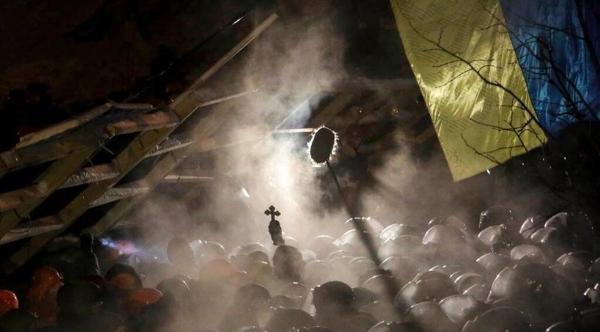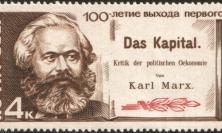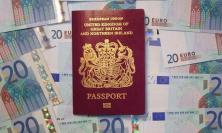
Writing from Ukraine, David Nazar SJ gives a first-hand account of the recent events in the country. The media coverage has been littered with misunderstandings, he says, particularly in the reporting of the influence of the oligarchs and the role played by Russia. What is really going on in this ‘apocalyptic’ confrontation between the people and the government?
The recent events in Ukraine are not what many news sources, even respected ones, imagine them to be. First, Ukraine was not a battleground where Russia and the West were hammering it out. Indeed, 99% of what was taking place on ‘the maidan’, the central square in Kyiv, was based on issues internal to Ukraine. Second, there was never the threat of civil war, as everyone living in Ukraine knew.
Unexpected developments seem to emerge on an almost-hourly basis, but in fact all the events are quite definable, the players well-known and the possibilities limited. There are three separate moments in the current drama, each of which has its own dynamic. The first and most important moment is the demonstration-turned-revolution on the maidan. This protracted standoff between an honest, popular yearning and deceitful, corrupt government was understood from the outset as a spiritual, even apocalyptic, battle between good and evil. It was unimaginable without the youth and the Church. The second follows the first and, while less dramatic, it is more complex: the creation of a style of government based on new values. This work entails the definitive cleansing of the vestiges of Soviet-style governance and the establishment of what the West takes for granted: transparency, accountability, fair elections and basic justice. The maidan now exercises a role of civic stewardship until such governance is in place. The third moment is the illegal intervention of President Putin in Crimea, which is less an act of aggression than an act of fear. It is not related to the maidan except as an opportunistic exploitation of it.
The maidan is the fourth major demonstration since Ukrainian independence in 1991, and the three that have gone before have brought healthy change to the country. The demonstrations in 1991, 2001 and 2004 were single-issue affairs; this fourth one has come to be directed precisely against the root of the problem. For three years, opposition parties have tried unsuccessfully to get the masses to confront the obvious and odious corruption of government. But people have seen that, no matter what party is in power, too much corruption, privilege and lack of respect for the will of the people remain. Hopes have long rested on a new generation coming into politics and new values being established in government. The signing of the EU Association Agreement was to be a step in this direction.
It was the president’s unexplained refusal to sign the Association Agreement that triggered the beginning of this demonstration. He was betraying an eleven-year preparation that had been inaugurated by an act of parliament. The youth, well-educated and with international experience, felt this sudden reversal most dramatically. When the president, equally inexplicably, ordered the violent dispersal of the demonstrating students at 3.45 one morning, the maidan went from demonstration to revolution. In two days, 700,000 people of all ages from all parts of the country were on the maidan. From this point, the language that best describes the events is spiritual.
It was never a battle between political parties, nor between regions of the country, nor between ideologies. It was not a battle for power, despite Russian media claims to the contrary. There were no fascists, neo-Nazis, extremists, or terrorists, despite fabricated Russian video to the contrary. A non-violent demonstration of youth was met with the illegal, unannounced and brutal use of police special forces.
The president’s failure to sign the agreement was like throwing dynamite on a faultline: the hopes and expectations of the people were dashed by surely the most corrupt and self-serving president in Ukraine’s history. This point needs to be understood. Without public justification, without preparation, without an alternative vision, in the end without any transparency, the president did what he wanted against the will of the majority. Ukrainians, through wisdom and hard experience, know that violence is not the response that will bring the desired change. And this must also be underscored: the crowd could have violently taken over whatever it wanted, but at the outset not a window was broken. The response of the government, by contrast, was to increase violence and engage in deceit. And here is the apocalyptic dimension: the people’s demands were articulate, hope-filled, peaceful, promised benefit for all and made in daylight in the open square, while the government had no rational explanation, no argument or alternative vision, only violence, usually at night.
Pious though it may appear, intellectuals began quoting scripture to explain what was happening. The ‘beast’ within the government had been drawn out and now had nowhere to hide. In December, only a month into the three-month maidan, one of the country’s noted historians eerily predicted that this would not end without the death of the innocent (Matthew 2:16), whose feast day was approaching.
Religious sensibility is at the heart of Ukrainian culture. Holy days are often national holidays. On holy days, hundreds stand in attendance outside of crowded churches. All of the religions and Christian confessions, with the exception of the Moscow Patriarchate which is associated with Yanukovich, were present on the maidan. On the day of the very first massive gathering, Cardinal Husar, the most respected religious figure in the country, was asked to address the crowd. Representatives of other denominations spoke in turn. A chapel was set up in the centre of the square for services and confessions. Priests led prayer from the main stage every hour. We, Jesuits, helped out and were surprised by conversion stories. Unchurched people confessed that they felt God was with them on the maidan, that God cared about their just yearnings. People collectively forbade the presence of alcohol on the maidan. The refrains of non-violence were as constant as the determination to bring an end to corrupt government. Ambassadors and diplomats witnessed this daily and it was, indeed, impressive. There was a spirit of joy, of confidence in the resolution of what had to be done, amid the sober awareness that more violence from the government was likely.
The Churches unambiguously stood with the people and called the government to dialogue. Bishops and priests were among the many who spoke insistently for non-violence on the maidan. Their appeal, like that of the people, was for the values that guarantee healthy society: justice, transparency, reconciliation, social inclusion. What some EU and American representatives there came to realise is that the people speak the values of the West. As European diplomats quipped, Ukrainians are European, even if the government is not. It is these very values, whose roots are Christian and which the West takes for granted, that represent the longing of the people and the healing of the country.
President Yanukovich’s refusal to sign the Association Agreement represents a rejection of these values. He had promised the EU in 2011 that he would deal with systemic corruption and to bring reform to the notoriously corrupt court system. However, he could not address either without undermining his own network of dubious wealth. When he came to office after the financial crisis, Ukraine’s debt was $30 billion; after three years under Yanukovich, it is $76 billion and the country is on the verge of default. He could have received a default-saving loan from the IMF at a lower interest rate than from Russia, if the corruption issues were addressed. He chose instead to save himself from scrutiny and so he turned to Russia, which does not have the same requirements. Even China refused the president financial aid.
What was shocking to those in the president’s circle was that the violence did not produce the desired effect. People were not cowed or fleeing into silent fear. The president’s opponents had been mercilessly beaten, kidnapped and jailed without cause – as were their lawyers; sympathetic businesses were ‘visited’ by the police and residency permits of sympathetic foreigners revoked; 50 cars carrying food and clothing to the maidan were burned during the night, and traffic police were attempting to fine buses and private cars carrying demonstrators; and attempts have been made to repress the media – national and international journalists have been beaten. These tactics, however, proved impotent and the government showed its only weapon, violence, and its fear.
Sadly, and again unaccountably, Yanukovich could have ended the demonstrations early by dismissing the minister of government in charge of the police, or the chief of police. People admit they would have gone home had this happened. Yet, no act of reconciliation, no acknowledgement of the suffering, kidnapping and death of demonstrators, no acceptance of any responsibility for the violence came forth. With every future step, he and his circle went further into violence, while the maidan remained peacefully resolute – until 16 January.
On 16 January the government unconstitutionally passed into law limits on public association and freedom of the press, punishable by 15 years in prison. It ordered riot troops to shoot rubber bullets at night to clear the crowd. From this point, demonstrators began prying up cobblestones and preparing Molotov cocktails to throw at the armed troops. On 19 February, despite public promises to the contrary, the president gave orders for snipers to shoot to kill. Nineteen died that day, predominantly from bullets to the head and heart. News cameras and police cameras filmed the maidan day and night. They showed Molotov cocktails and cobblestones but never was a gun seen in the hands of demonstrators. This week the security forces revealed that they were ordered to shoot police as well, in order to lay blame on demonstrators. Sixteen police died. The current tally reads thus: 101 dead, 726 injured, over 400 still in hospital, and 50 still missing. Indeed, the innocent were slain. Their funerals are held publicly on local maidans.
Yanukovich then agreed to return to the 2004 Constitution, which he and the courts had amended illegally in 2010. The earlier Constitution places ultimate authority in parliament, not in the president. He now faced the possibility of criminal investigation. The next day, 22 February, he unaccountably disappeared: there was no threat of death or violence; he was still president. Security cameras show him and his guards loading vans and two helicopters with the valuables from a palace which he built for himself with government money and fleeing into the night. The documents he left behind showing where money came from and to whom it went provide a detailed incrimination; there is evidence that he and his closest circle stole about $10 billion each year directly from the budget via various corrupt schemes. On this legal basis, he and about 18 others are having their accounts frozen in Europe, Canada and the U.S.
Among the multitude of misunderstandings in circulation, there are three in particular that convey the exact opposite of the truth about the situation. First, Ukraine is not controlled by the so-called oligarchs, even though there are some in the country. The economy is dominated by the middle class which is substantial here, unlike in Russia. Second, these oligarchs want integration with the EU to modernise factories, to enter larger markets and to stabilise Ukraine. Any of seven countries in the EU has a larger economy than Russia and together the EU has an economy 12 times the size. Russia has no modern technology and nothing to offer other than gas and billionaires. In fact, the oligarchs at one time forced Yanukovich’s hand by demanding that ‘their men’ in his party vote against him during the current revolution. And they are for the most part from the so-called Russian-speaking region of Ukraine, which brings us to the third point. Many foreigners and media outlets, including the BBC, make a common, erroneous presumption which must be corrected: to speak Russian or to be from a Russian-speaking area says nothing about your political leanings. Ethnically, the population of Kyiv is 80% Ukrainian, but due to the education policy of the USSR which lasted 70 years, 70% of Kyiv speaks Russian as a first language; yet over 80% of Kyiv has always voted against Yanukovich’s party. In the latest poll, only 27% of the whole country would prefer closer ties with Russia, but it is clear on further analysis that they want better, friendly relations with Russia, not economic union. And even that percentage diminishes every year.
Russia is not the factor in this that many might imagine. President Putin’s interest is in creating a competitive economic block. To this end he has dedicated almost ten years of his life, trying to force neighbouring countries into his Eurasian Union, for which Ukraine is essential. From 2006 until today, with specious reasoning, Russia has cut off Ukraine’s gas in winter twice, forbidden Ukrainian meat imports once, milk products twice and confectionary products once – all attempts to force Ukraine into the union. The invasion of Crimea is a variation on the theme. Ukraine has not submitted but kept its European orientation.
Europe and North America, despite their issues, have incarnated values and laws that derive historically from the gospel and are ‘salvific’ for themselves and for countries like Ukraine. Even the basic principles of operative capitalism are therapeutic for Ukraine: budgeting, accounting, transparency, accountability to boards of directors and to government overseers and to the people. The West too quickly sees its problems without seeing the moral depth it has within its traditions and procedures. Ironically, perhaps Ukraine has something inspiring to offer at this time. These values are worth struggling for – insistently, peacefully, inclusively and prayerfully.
At the Church’s prompting, much of Ukraine continues to pray and fast during Lent until all is resolved. This is a country acquainted with suffering and familiar with grief – and from this arises a hope in the fidelity of God. (Isaiah 53)
David Nazar SJ is Superior of the Jesuits in Ukraine.





